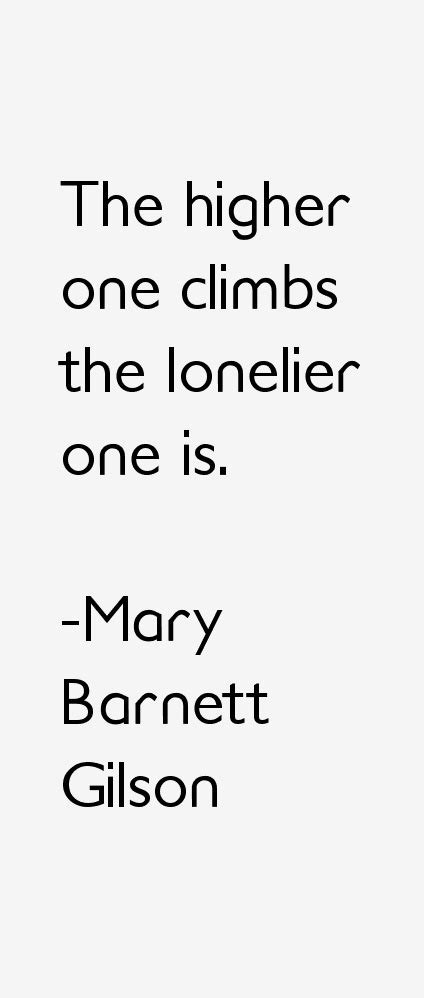Top 272 Satisfactory Quotes & Sayings - Page 5
Explore popular Satisfactory quotes.
Last updated on April 19, 2025.
How ignorant we are! How ignorant everyone is! We can cut across only a small area of the appallingly expanding fields of knowledge. No human being can know more than a tiny fraction of the whole. It must have been satisfactory in ancient times when one's own land seemed to be the universe; when research studies, pamphlets, books did not issue in endless flow; when laboratories and scientists were not so rapidly pushing back frontiers of knowledge that the process of unlearning the old left you gasping for breath.
She was trying to say something else; she was trying to say that the inability to articulate what one feels in any satisfactory way is one of our enduring tragedies. It wouldn't have been much, and it wouldn't have been useful, but it would have been something that reflected the gravity and the sadness inside her. Instead, she had snapped at him for being a loser. It was as if she were trying to find a handhold on the boulder of her feelings, and had merely ended up with grit under her nails.
The question is very understandable, but no one has found a satisfactory answer to it so far. Yes, why do they make still more gigantic planes, still heavier bombs and, at the same time, prefabricated houses for reconstruction? Why should millions be spent daily on the war and yet there's not a penny available for medical services, artists, or for poor people? Why do some people have to starve, while there are surpluses rotting in other parts of the world? Oh, why are people so crazy?
One realizes that human relationships are the tragic necessity of human life; that they can never be wholly satisfactory, that every ego is half the time greedily seeking them, and half the time pulling away from them. In those simple relationships of loving husband and wife, affectionate sisters, children and grandmother, there are innumerable shades of sweetness and anguish which make up the pattern of our lives day by day, though they are not down in the list of subjects from which the conventional novelist works.
We go into a relationship looking for love, not realizing that we must bring love with us. We must bring a strong sense of self and purpose into a relationship. We must bring a sense of value, of who we are. We must bring an excitement about ourselves, our lives, and the vision we have for these two essential elements. We must bring a respect for wealth and abundance. Having achieved it to some satisfactory degree on our own, we must move into relationships willing to share what we have, rather than being afraid of someone taking it.
The reader can test his own psychology by asking himself whether he would consider, in retrospect, the selling at 156 in 1925 and buying back at 109 in 1931 was a satisfactory operation. Some may think that an intelligent investor should have been able to sell out much closer to the high of 381 and to buy back nearer the low of 41. If that is your own view you are probably a speculator at heart and will have trouble keeping to true investment precepts while the market rushes up and down.
It is wrong for a man to say that he is certain of the objective truth of any proposition unless he can produce evidence which logically justifies that certainty. This is what Agnosticism asserts; and, in my opinion, it is all that is essential to Agnosticism. That which Agnostics deny and repudiate, as immoral, is the contrary doctrine, that there are propositions which men ought to believe without logically satisfactory evidence; and that reprobation ought to attach to the profession of disbelief in such inadequately supported propositions.
What is true is that the idea of power corrupts. Power corrupts most rapidly those who believe in it, and it is they who will want it most. Obviously, our democratic system tends to give power to those who hunger for it and gives every opportunity to those who don't want power to avoid getting it. Not a very satisfactory arrangement if power corrupts those who believe in it and want it.
When I came overseas, I realized that there are many ideologies and many trends, and it's also very hard to produce honest art and honest literature. I decided that I didn't want to follow any of these ideologies or trends, because that's also a kind of pressure that doesn't allow absolute freedom. So I decided that I was only going to produce works that were satisfactory to me, and that meant not following any trends and being anti-ideological.
I really am a pessimist. I've always felt that fascism is a more natural governmental condition than democracy. Democracy is a grace. It's something essentially splendid because it's not at all routine or automatic. Fascism goes back to our infancy and childhood, where we were always told how to live. We were told, Yes, you may do this; no, you may not do that. So the secret of fascism is that it has this appeal to people whose later lives are not satisfactory.
That the boat did not upset I simply state as a fact. Why it did not upset I am unable to offer any reason. I have often thought about the matter since, but I have never succeeded in arriving at any satisfactory explanation of the phenomenon. Possibly the result may have been brought about by the natural obstinacy of all things in this world. The boat may possibly have come to the conclusion, judging from a cursory view of our behaviour, that we had come out for a morning's suicide, and had thereupon determined to disappoint us. That is the only suggestion I can offer.
There is a strong current in contemporary culture advocating ' holistic ' views as some sort of cure-all... Reductionism implies attention to a lower level while holistic implies attention to higher level. These are intertwined in any satisfactory description: and each entails some loss relative to our cognitive preferences, as well as some gain... there is no whole system without an interconnection of its parts and there is no whole system without an environment.
A young financial writer once brought ridicule upon himself by stating that a certain company had nothing to commend it except excellent earnings. Well, there are companies whose earnings are excellent but whose stocks I would never recommend. In selecting investments, I attach prime importance to the men behind them. I'd rather buy brains and character than earnings. Earnings can be good one year and poor the next. But if you put your money into securities run by men combining conspicuous brains and unimpeachable character, the likelihood is that the financial results will prove satisfactory.
Here's a pointer culled from the careers of men who have attained notable success: Don't sit in your office during the hours prospects can be seen. Do your office work before or after the hours during which possible customers can be reached. This may mean adding an hour or two quite often to your day's work; but in times like this particularly, the securing of a satisfactory amount of business through the expenditure of an extra hour or two a day is not an unreasonable price to pay.
Kant regards the universalizability test for maxims as focused on a very special sort of situation: one where the agent is tempted to make an exception to a recognized duty out of self-preference. The universalizability test is supposed help the agent to see, in a particular case of moral judgment, that self-preference is not a satisfactory reason for exempting yourself from a duty you recognize. Kant thinks, as a matter of human nature, that this situation arises often enough and that we need a canon of judgment to guard against it.
We were told in one lecture that it was possible to immunize against diphtheria and tetanus by the use of chemically treated toxins, or toxoids. And the following lecture, we were told that
for immunization against a virus disease, you have to experience the infection, and that you could not induce immunity with the so-called "killed" or inactivated, chemically treated virus preparation. Well, somehow, that struck me. What struck me was that both statements couldn't be true. And I asked why this was so, and the answer that was given was in a sense, 'Because.'
There was no satisfactory answer.
In one sense, no act of reparation will be satisfactory for those whose lives were so under-valued both as human beings held in slavery and then as human chattel to satisfy the financial indebtedness of a Catholic institution. Nonetheless, the university must also put into place - as it is attempting to do - a program that both admits the horror and error of its past actions and directs its students, faculty, and administrations to an awareness of the dignity of all people, especially those who even today are often considered less than worthy of respect and dignity.
We are convinced that the intelligent investor can derive satisfactory results from pricing of either type (market timing or fundamental analysis via price). We are equally sure that if he places his emphasis on timing, in the sense of forecasting, he will end up as a speculator and with a speculator's financial results." And "The speculator's primary interest lies in anticipating and profiting from market fluctuations. The investor's primary interest lies in acquiring and holding suitable securities at suitable prices.
Like no other illness, AIDS tests our ability to put ourselves in someone else's shoes - to empathize with the plight of our fellow man. While most would agree that the AIDS orphan or the transfusion victim or the wronged wife contracted the disease through no fault of their own, it has too often been easy for some to point to the unfaithful husband or the promiscuous youth or the gay man and say This is your fault. You have sinned. I don't think that's a satisfactory response. My faith reminds me that we all are sinners.
I have often said one of the greatest secrets of missionary work is work! If a missionary works, he will get the Spirit; if he gets the Spirit, he will teach by the Spirit; and if he teaches by the Spirit, he will touch the hearts of the people and he will be happy. There will be no homesickness, no worrying about families, for all time and talents and interests are centered on the work of the ministry. Work, work, work-there is no satisfactory substitute, especially in missionary work.
The children's writer not only makes a satisfactory connection between [the writer's] present maturity and his past childhood, he also does the same for his child-characters in reverse - makes the connection between their present childhood and their future maturity. That their maturity is never visibly achieved makes no difference; the promise of it is there.
We godless lack that certainty, and we know the world is a complex place that requires compromise and is not ruled by a moral force - virtue is subject to negotiation, and is found in working together with others to find mutually satisfactory solutions. Good is not absolute, it is an emergent property that arises from successful networks of individuals. It is also something that is measured by evidence: we look at the good that people do, not the promises that they make and never keep, or the lies that dovetail nicely into dogma. Competence is a virtue. Intent is meaningless without action.
Although I am still in favour of a National Government in these difficult times, and shall probably be found in the great majority of cases in the Government Lobby, there are some issues that have arisen, or are likely to arise, upon which I am unable to give the Government the support which it has, perhaps, the right to expect from those receiving the Government Whip. It occurs to me, therefore, that it would perhaps be more satisfactory if I was no longer regarded as being among the supporters of the present Administration.
A willing, cheerful worker, with his heart in his job, will turn out more work and more satisfactory work in 44 hours than an unwilling worker, dissatisfied with his conditions, will turn out in 54 hours. It is good business, therefore, for every employer to go as far as he possibly can in reaching a schedule agreeable to his people.
Contemporary philosophers have exercised themselves with the problem of our knowledge of other minds. Enmeshed in the dogma of the ghost in the machine, they have found it impossible to discover any logically satisfactory evidence warranting one person in believing that there exist minds other than his own. I can witness what your body does, but I cannot witness what your mind does, and my pretensions to infer from what your body does to what your mind does all collapse, since the premises for such inferences are either inadequate or unknowable.
The indexing problem changes with each new book undertaken. To meet the needs of different classes of seekers and to suit various types of books, rules entirely satisfactory in one case must be varied in the next and perhaps ignored or even reversed for a third... Indexing is a highly complex intellectual process involving the use of language in a specific and somewhat artificial way, and that it is also to a considerable extent a matter of intuition, the workings of which cannot be reduced to fixed rules. It is 'knowing what but not knowing how'.
Do too many executives still indulge in the short-sighted habit of issuing orders without taking the slightest pains to explain to those responsible for carrying them out the whyfor and wherefor of the orders? Where employees come in daily and hourly contact with the public, surely it is important that care be taken to fit them to reply intelligently to courteous questions. ""Because them are orders"" isn't a satisfying reply-even less satisfactory to the management than to the public.
Although a biologist, I must confess I do not understand how life came about... I consider that life only starts at the level of a functional cell. The most primitive cells may require at least several hundred different specific biological macro-molecules. How such already quite complex structures may have come together, remains a mystery to me. The possibility of the existence of a Creator, of God, represents to me a satisfactory solution to this problem.
Therefore I begin to think, my Lord, you purposely allow us to be brought into contact with the bad and evil things that You want changed. Perhaps that is the very reason why we are here in this world, where sin and sorrow and suffering and evil abound, so that we may let You teach us so to react to them, that out of them we can create lovely qualities to live forever. That is really the only satisfactory way of dealing with evil. Not simply binding it so that it cannot work harm, but whenever possible overcoming it with good.
And nothing inspires as much shame as being a parent. Children confront us with our paradoxes and hypocrisies, and we are exposed. You need to find an answer for every why — Why do we do this? Why don’t we do that? — and often there isn’t a good one. So you say, simply, because. Or you tell a story that you know isn’t true. And whether or not your face reddens, you blush. The shame of parenthood — which is a good shame — is that we want our children to be more whole than we are, to have satisfactory answers.
How do you listen? Do you listen with your projections, through your projection, through your ambitions, desire, fears, anxieties, through hearing only what you want to hear, only what will be satisfactory, what will gratify, what will give comfort, what will for the moment alleviate your suffering? If you listen through the screen of your desires, then you obviously listen to your own voice.
I see the situation of man in the world of planetary technicity not as an inexitricable and inescapable destiny, but I see the task of thought precisely in this, that within its own limits it helps man as such achieve a satisfactory relationship to the essence of technicity. National Socialism did indeed go in this direction. Those people, however, were far too poorly equipped for thought to arrive at a really explicit relationship to what is happening today and has been underway for the past 300 years.



























